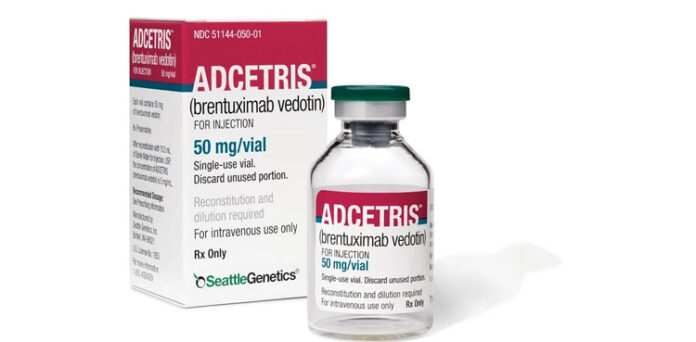03 June 2024 | Monday | News

Picture courtesy | Public Domain
Pfizer Inc. announced detailed overall survival (OS) results from the Phase 3 ECHELON-3 study of ADCETRIS® (brentuximab vedotin) in combination with lenalidomide and rituximab for the treatment of patients with relapsed/refractory diffuse large B-cell lymphoma (DLBCL). The study showed that the ADCETRIS combination reduced patients’ risk of death by 37% compared to placebo in combination with lenalidomide and rituximab (HR 0.63 [95% CI: 0.445-0.891] p=0.0085). The overall survival benefit was consistent across levels of CD30 expression.
The ECHELON-3 results will be presented as a late-breaker (LBA7005) in an oral session at the 2024 American Society of Clinical Oncology (ASCO) Annual Meeting along with four-year results from the Phase 3 HD21 trial in advanced classical Hodgkin lymphoma (cHL) (LBA7000).
“ECHELON-3 is one of the first randomized, placebo-controlled Phase 3 studies to demonstrate an overall survival benefit in patients with relapsed/refractory DLBCL after two or more prior lines of systemic therapy,” said principal investigator Dr. Jeung-A Kim, College of Medicine, The Catholic University of Korea. “The clinically meaningful improvement in survival demonstrates the potential benefit of this ADCETRIS regimen in relapsed/refractory DLBCL, particularly for patients whose disease has progressed after CAR-T therapy or bispecific antibody treatment or individuals who are not able to receive these treatments.”
ADCETRIS is approved in the U.S. as monotherapy or in combination with chemotherapy for seven lymphomas including certain types of cHL, anaplastic large cell lymphoma and peripheral T-cell lymphoma. Seven-year survival data for an ADCETRIS regimen for patients with advanced stage cHL will be shared in a poster presentation (7053) at the ASCO Meeting on June 3.
“Three Phase 3 trials in three different types of lymphoma have now demonstrated that an ADCETRIS-containing regimen improved overall survival,” said Roger Dansey, M.D., Chief Development Officer, Oncology, Pfizer. “ADCETRIS is a standard of care medicine in its approved indications today, and these impressive results from an interim analysis highlight its potential to benefit people with relapsed/refractory DLBCL regardless of CD30 expression.”
DLBCL is the most common lymphoma and is aggressive and difficult to treat, with up to 40 percent of patients experiencing disease progression after initial therapy.1,2
Among 230 randomized patients in the trial, the interim analysis showed that median OS in patients randomized to receive ADCETRIS, lenalidomide and rituximab was 13.8 months (95% CI: 10.3-18.8) compared to 8.5 months (95% CI: 5.4-11.7) in patients randomized to lenalidomide and rituximab plus placebo.
Median progression-free survival (PFS) was 4.2 months (95% CI: 2.9-7.1) in the ADCETRIS arm versus 2.6 months (95% CI: 1.4-3.1) in the lenalidomide and rituximab plus placebo arm (HR 0.527 [95% CI: 0.380-0.729] p<0.0001). The overall response rate for patients treated with the ADCETRIS regimen was 64.3% (95% CI: 54.7-73.1) versus 41.5% (95% CI: 32.5-51.0) in the lenalidomide and rituximab plus placebo arm. The complete response rate was 40.2% in ADCETRIS-treated patients (95% CI: 31.0%, 49.9%) compared to 18.6% (95% CI:12.1%, 26.9%) in the lenalidomide and rituximab plus placebo arm.
The most frequently reported treatment-emergent adverse events (TEAEs) Grade 3 or higher for the ADCETRIS versus placebo arms were: neutropenia (43% vs 28%), thrombocytopenia (25% vs 19%) and anemia (22% vs 21%). Peripheral sensory neuropathy was infrequent and low grade for each arm with Grade 3 events of 4% vs 0%.
© 2026 Biopharma Boardroom. All Rights Reserved.